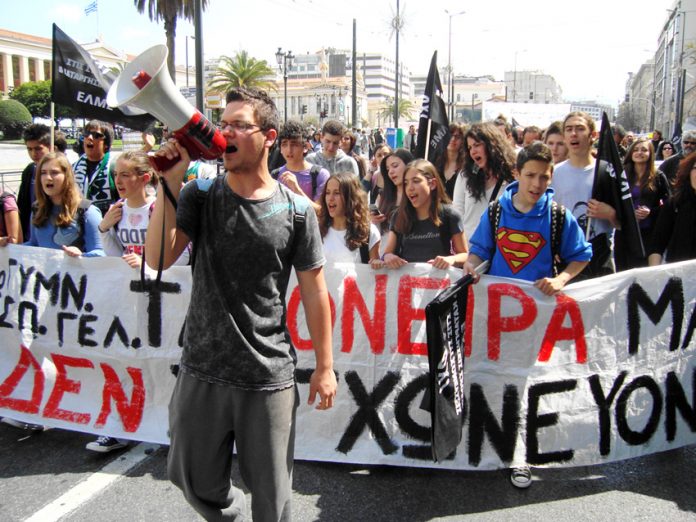Some 4,000 primary and secondary school teachers, from both state and private schools, plus state hospital doctors, short-contract workers of the Athens municipality, university and school students held a militant demonstration last Wednesday afternoon through the Greek capital’s city centre.
The action was part of a national 24-hour teachers’ and hospital doctors’ strike against the recent announcements by the Ministries for Education and Health that thousands of schools and libraries must be closed down throughout Greece, and that state hospitals must ‘merge’ or shut down.
Top of the Ministries’ ‘closures list’ are the special schools for children with special needs and children’s hospital wards.
Marches were held in all Greek cities and towns. Both the teachers’ and doctors’ trade unions reported very high participation in the strike.
This was to be a one-day general strike against schools and hospital closures, as demanded by many resolutions of trade unions and trades councils, but the treacherous bureaucracy of the GSEE (Greek TUC) and ADEDY (public sector workers federation) leaders refused to call it.
Alongside the planned hospital closures, the Greek government has actually stopped paying pharmacists for the medicine received by workers and old age pensioners.
Desperate and angry patients have been queuing for hours at hospitals and pharmacists shops to find out that the necessary medicine is not available to them unless they pay cash.
These feelings were reflected in the high spirits and militancy of the march which kept up a constant barrage of chanting slogans against the government, the IMF and the European Commission.
There were also slogans against the imperialist bombing of Libya and witty chants calling the Greek Prime Minister Papandreou to leave Greece on a helicopter like Ben Ali and Mubarak.
The Athens demonstration marched to the Athens Town Hall which has been under occupation for over a week now by the 2,500 short-contract workers who demand permanent jobs, and are being fully supported by all other Athens Municipality workers.
There were scenes of jubilation and enthusiasm at the Athens Town Hall when the march arrived with workers inside and outside exchanging slogans against the government and for the creation of a public sector united front.
Speakers from the occupation stated that they were determined to stay put until they have won.
The demonstration then marched to the Vouli (Greek parliament) which was heavily guarded by riot police. Earlier the Greek Communist Party (KKE) held their own separate march of some 1,500 teachers, doctors and students.
Recently, the state Greek Statistics Authority announced that unemployed workers (including those on so-called ‘training schemes’) reached one million at the end of last year and was rising fast.
Now, the Scientific Advisor of GSEE-ADEDY, Savas Robolis, speaking at a Parliamentary Special Commission, stated that by 2012 there will be over 1.2m workers out of work.
This means that there will be over half a million workers who would lose their jobs in Greece in the course of this year.
Expressing his faith that capitalism in Greece would overcome the crisis, Robolis cynically added that he estimates that only after 2020 there will be a return to the 2008 unemployment levels.
Following yet another downgrading of Greece last Tuesday by the rating agency Standard and Poor’s, Prime Minister Yiorghos Papandreou revealingly stated that, ‘the rating agencies have gone from the bubble of euphoria to panic and pessimism, they are the same people who rated as AAA the toxic firms and banks responsible for the crisis’.
The rating agencies, working hand in glove with the banks, have been attacking the corpse of Greek capitalism like vultures.
Early in March, Moody’s downgraded Greece, now Standard and Poor’s has sent Greece down two levels to BB- and has classified Greek state bonds as junk.
The third main rating agency, Fitch, classifies Greece as BB+ but in their report point to ‘negative perspectives’ and once again questions the ability of the country to overcome the crisis, given the estimate that by 2012 Greece’s debt would reach the colossal 160 per cent of GNP.
